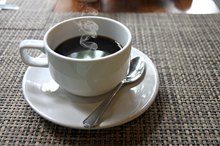Why Does Caffeine Give Me a Headache?
The average American consumes 227 milligrams of caffeine every day -- equal to about three cups of coffee. For most people, caffeine is perfectly harmless and triggers no side effects. In more sensitive people, however, it might trigger anything from shakiness to dehydration to increased urination. Some people might also develop headaches associated with caffeine.
Amount of Caffeine
You might be getting headaches if you’re consuming very high amounts of caffeine. According to Ask the Dietitian, this is particularly common in people who get caffeine from multiple sources. For example, you might be getting caffeine from coffee and thinking that’s all you need to consider. However, caffeine can also be found in soda, energy drinks, chocolate, tea, sport drinks and certain pain medication. Headaches might develop if you consume 200 milligrams to 500 milligrams of caffeine per day.
- You might be getting headaches if you’re consuming very high amounts of caffeine.
- According to Ask the Dietitian, this is particularly common in people who get caffeine from multiple sources.
Dealing With Caffeine Excess
Can Excess Caffeine Cause Rashes?
Learn More
If you believe you’re consuming too much caffeine, write down everything you drink or eat that contains it. Look for other symptoms that might indicate you’re consuming too much caffeine, such as tremors and irregular heartbeats. Also, try eating something along with your coffee, so the caffeine won’t hit you on an empty stomach. Caffeine on an empty stomach can trigger side effects more rapidly.
- If you believe you’re consuming too much caffeine, write down everything you drink or eat that contains it.
- Look for other symptoms that might indicate you’re consuming too much caffeine, such as tremors and irregular heartbeats.
Lack of Caffeine
While you might think that your headache is connected to consuming caffeine, it might actually be the opposite. If you’re used to drinking large amounts of caffeine, significantly reducing the amount you consume might trigger a withdrawal headache. For example, let’s say you normally drink a 16-ounce cup of coffee in the morning. Then you decide to switch to a regular 6-ounce cup of coffee. Anywhere from 30 to 60 minutes after drinking that small cup of coffee, you develop a headache. As your body processes the caffeine, your body might realize there’s not enough of it and a headache ensues.
- While you might think that your headache is connected to consuming caffeine, it might actually be the opposite.
- If you’re used to drinking large amounts of caffeine, significantly reducing the amount you consume might trigger a withdrawal headache.
Headache Relief
Caffeine & Back Pain
Learn More
Although caffeine can cause headaches in some people, it can also have the opposite effect. In some people, caffeine helps relieve headaches. In fact, caffeine is also added to over-the-counter pain relievers. According to the National Headache Foundation, pain relievers with caffeine are up to 40 percent more effective than those without caffeine.
- Although caffeine can cause headaches in some people, it can also have the opposite effect.
- In some people, caffeine helps relieve headaches.
Related Articles
References
- National Geographic: Caffeine; T. R. Reid
- Today's Dietitian: Coffee and Heart Health — The Answers to Many Common Questions Are Still Brewing
- Ask the Dietitian: Caffeine, Coffee, Tea, Cola & Energy Drinks
- Zaragoza J, Tinsley G, Urbina S, et al. Effects of acute caffeine, theanine and tyrosine supplementation on mental and physical performance in athletes. J Int Soc Sports Nutr. 2019;16(1):56. doi:10.1186/s12970-019-0326-3
- Higashi Y. Coffee and endothelial function: A coffee paradox? Nutrients. 2019;11(9). doi: 10.3390/nu11092104
- Temple JL, Bernard C, Lipshultz SE, Czachor JD, Westphal JA, Mestre MA. The safety of ingested caffeine: A comprehensive review. Front Psychiatry. 2017;8:80. doi:10.3389/fpsyt.2017.00080
- National Institute on Drug Abuse for Teens. Is caffeine really addictive? Updated 2020.
- The American College of Obstetrics and Gynecology. Moderate caffeine consumption during pregnancy. Updated 2016.
- Kids Health from Nemours. Caffeine. Updated 2017.
- Beydoun MA et. al. Caffeine and alcohol intakes and overall nutrient adequacy are associated with longitudinal cognitive performance among U.S. adults. The Journal of Nutrition. 2014;144(6);890-901. doi:10.3945/jn.113.189027
Writer Bio
Tammy Dray has been writing since 1996. She specializes in health, wellness and travel topics and has credits in various publications including Woman's Day, Marie Claire, Adirondack Life and Self. She is also a seasoned independent traveler and a certified personal trainer and nutrition consultant. Dray is pursuing a criminal justice degree at Penn Foster College.









